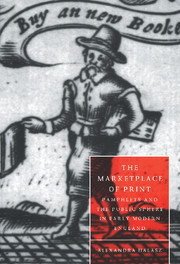3 - The patrimony of learning
Published online by Cambridge University Press: 10 December 2009
Summary
How many Quires (can any Stacioner tell)
Were bandied then, t'wixt him and Gabriell?
Who brutishly my beauty so did blot
With Gaulie girds by Pens pumpt from th'inck-pot
That I more ugly then a Satire seemd:
Nay, for a hellish Monster was esteemd.
Yet, if, in Judgment, I should spend my breath,
The Doctor foyld him with his Dagger sheath.
John Davies of Hereford, “Paper's Complaint” (1611)Supply
Writing in 1581, the pedagogue Richard Mulcaster describes the oversupply of educated men that was among the consequences of the “educational revolution” of the sixteenth century.
To[o] many [learned men] burdens any state to[o] farre: for want of provision. For the rowmes which are to be supplyed by learning being within number, if they that are to supply them, grow on beyound number, how can it be but too great a burden for any state to beare? To have so many gaping for preferment, as no goulfe hath stoore enough to suffise, and to let them rome helples, whom nothing else can helpe, how can it be but that such shifters must needes shake the verie strongest piller in that state where they live, and loyter without living? (Positions, 139)
The problem, as he formulates it, arises in a sociopolitical order that allocates learning to limited sites, and yet, in allowing an expanded high literacy, creates the possibility, if not the inevitability, of sedition. Though Mulcaster's comment can be read as prescient, both in its prediction of an oversupply that was only beginning to be evident when he wrote, and in relation to the sociopolitical ferment that lead to the Civil War, I invoke it because he so clearly associates “learning” with its instrumental deployment and that deployment with a specific sense of space, “rowmes.”
- Type
- Chapter
- Information
- The Marketplace of PrintPamphlets and the Public Sphere in Early Modern England, pp. 82 - 113Publisher: Cambridge University PressPrint publication year: 1997

